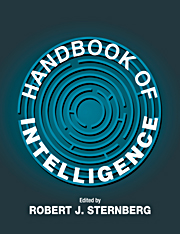Book contents
- Frontmatter
- Contents
- Preface
- Contributors
- PART I THE NATURE OF INTELLIGENCE AND ITS MEASUREMENT
- PART II DEVELOPMENT OF INTELLIGENCE
- PART III GROUP ANALYSES OF INTELLIGENCE
- PART IV BIOLOGY OF INTELLIGENCE
- PART V INTELLIGENCE AND INFORMATION PROCESSING
- PART VI KINDS OF INTELLIGENCE
- PART VII TESTING AND TEACHING INTELLIGENCE
- 19 Psychometric Approaches to Understanding and Measuring Intelligence
- 20 Tests of Intelligence
- 21 Interpretation of Intelligence Test Scores
- 22 Teaching Intelligence: A Performance Conception
- PART VIII INTELLIGENCE, SOCIETY, AND CULTURE
- PART IX INTELLIGENCE IN RELATION TO ALLIED CONSTRUCTS
- Author Index
- Subject Index
19 - Psychometric Approaches to Understanding and Measuring Intelligence
Published online by Cambridge University Press: 05 June 2012
- Frontmatter
- Contents
- Preface
- Contributors
- PART I THE NATURE OF INTELLIGENCE AND ITS MEASUREMENT
- PART II DEVELOPMENT OF INTELLIGENCE
- PART III GROUP ANALYSES OF INTELLIGENCE
- PART IV BIOLOGY OF INTELLIGENCE
- PART V INTELLIGENCE AND INFORMATION PROCESSING
- PART VI KINDS OF INTELLIGENCE
- PART VII TESTING AND TEACHING INTELLIGENCE
- 19 Psychometric Approaches to Understanding and Measuring Intelligence
- 20 Tests of Intelligence
- 21 Interpretation of Intelligence Test Scores
- 22 Teaching Intelligence: A Performance Conception
- PART VIII INTELLIGENCE, SOCIETY, AND CULTURE
- PART IX INTELLIGENCE IN RELATION TO ALLIED CONSTRUCTS
- Author Index
- Subject Index
Summary
Since the Handbook of Human Intelligence appeared in 1982, the “psychometric approach” has changed dramatically. Traditionally, the psychometric approach was synonymous with the factor-analytic approach. Exploratory factor analysis was applied to discover the number and nature of the factors that underlie performance on cognitive tasks. Carroll's (1993) three-stratum model of intellect synthesizes the factors supported across hundreds of studies. Although the studies reported somewhat inconsistent factor patterns, Carroll found consistent support for several factors by reanalyzing their data with common methods of factor analysis.
However, the contemporary psychometric approach differs in three major ways from the traditional psychometric approach: (1) confirmatory approaches predominate over exploratory approaches, (2) structural analysis of items predominates over structural analysis of variables, and (3) item response theory (IRT) models predominate over factor analytic models. Thus, in the contemporary psychometric approach, confirmatory IRT models are applied to understand and measure individual differences. The intelligence construct is elaborated in confirmatory IRT models by comparing alternative models as explaining item responses. Some confirmatory IRT models include parameters to estimate the cognitive processing demands in items. These models permit items to be selected and banked by their cognitive demand features and provide results relevant to understanding what is measured by the items. Other confirmatory IRT models include parameters for person differences on the underlying processes, strategies, or knowledge structures. These models can define new types of individual differences. As will be elaborated below, parameters are included to measure qualitative differences in item responses such as relative success in various underlying cognitive operations, use of different strategies or knowledge structures, and modifiability of ability with intervention.
- Type
- Chapter
- Information
- Handbook of Intelligence , pp. 423 - 444Publisher: Cambridge University PressPrint publication year: 2000
- 14
- Cited by



